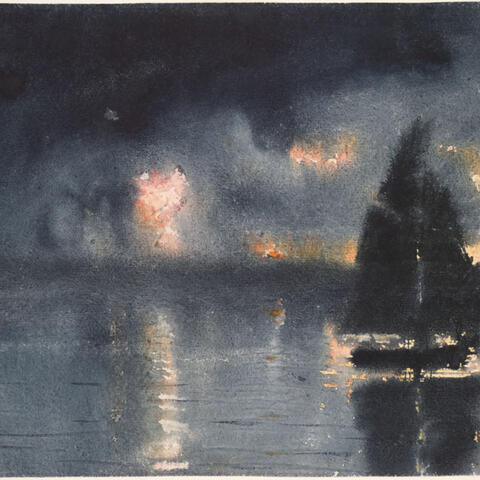Notes from a Writer’s Desk: The Gifts of Writing

Kay Shelemay, G. Gordan Watts Professor of Music at Harvard University and Professor of African and African American Studies, recently reflected on her approach to writing, reading, and research with postdoctoral fellow Samantha Jones. Professor Shelemay is the author of numerous articles and books spanning musical topics in Africa, the Middle East, and the United States. Her newest book, Sing and Sing On: Sentinel Musicians and the Ethiopian American Diaspora, was published by the University of Chicago Press in January 2022.
Below are edited excerpts from their conversation.
As an ethnomusicologist, your work is rooted in ethnography. You’ve often said that ethnography is a way of life, and this was the title of your keynote lecture at the Society for Ethnomusicology in 2018. Thinking about ethnography as both a method and a writing genre, how is ethnography as writing a way of life for you?
Ethnographic writing is a way of life because writing is a muscle. And if you don’t use that muscle, you can’t do it very well. A very critical part of ethnography is journaling. I don't see it as a division of participant observation, data gathering, and then writing. One constantly writes, and I see writing as a process.
I think back to using a handwritten journal, and when I was in Ethiopia, where I wrote “Ethnography as a Way of Life,” I actually took a notebook, and I was going to go back to the old practice of writing. We were at a hotel overlooking Addis Ababa and I was sitting on the terrace trying to write. I finally gave up and went down to the business office to use the computer.
When writing, I think with my fingers. I suppose one always typed, but in my first fieldwork I did handwriting. And that was a very different genre; it’s almost impossible now. I see writing now as a part of typing. And the computer really simplifies the process massively. When I think back to what I was able to capture and handwrite, it’s not a tenth of what I can get now.
I still scribble; I make notes. I have an ideas file that I keep. I’m a person who gets my ideas from data, and then I put it together in different ways. What I like about writing is problem solving.
You mention your ideas file. What are other aspects of your writing practice? Do you write every day?
I do write a lot. I always leave a lot of time to finish something. I like to have lots of time to edit and lots of time to think things through. I always feel much better about something when I have a long lead up time. You will rarely find me doing things at the last minute.
Especially when I am writing an article, I like to have time afterwards to go back to the literature and think about interactions, where my work intersects or doesn’t, or ideas of others that I maybe haven’t taken into account. Generally, I find with a project, one needs to read things beforehand, especially with ethnographic work. You read relevant things before you go into the field, you do your work, and then you read it again afterwards.
Reading is an integral part of writing. I wish I had more time to read because I’m convinced that reading makes you a better writer. From what I know of many novelists and fiction writers, they spend a great deal of time on the work of others. How do you know what you're doing is original if you don’t look at something others have done?
A lot of young scholars, especially graduate students, feel very deadline driven. How did you cultivate your own relationship to time and writing?
When I was writing my dissertation, I was in Ethiopia during the revolution. It was very isolating and very hard to write. One of my committee members was Wolf Leslau, a linguist of Ethiopian languages, and he visited us in Addis Ababa while on a research trip of his own. His advice was that I should decide to write for four hours day, and tell people not to call me, and don’t interrupt that time. He said pretty soon I’d find I’d be doing more and more. Well, I did it and sure enough I would write four hours and it just wasn’t enough. I would do five and six and seven. And I was able to finish very quickly. That suggestion about dedicating a bracketed time to writing embedded itself as sort of bodily practice. And you end up doing more than you thought that you could. I carried this practice after my return to Ann Arbor and I wrote four hours in the mornings, before I went to my work. And it worked beautifully.
Do you experience writer’s block, and if you do, how do you get out of it?
I hate to say this, but not usually. And in fact, I use writing to deal with times that are extraordinarily stressful and difficult. I’ve always written my way out of whatever trauma was around, from personal pressures to the Ethiopian revolution. I wrote. Writing, for me, is creative and peaceful. I have rarely been stressed by writing. When I sit down and I don't know what I’m going to say, if I sit and play with it, it eventually comes.
One night, in my first year teaching at Columbia, I had to give a big paper at the University of Chicago in Ethiopian studies. I wasn't happy with my dissertation; I thought it was too descriptive. And while I was stuck, I remembered my colleague Carolina Robertson had said, “Well, when you get stuck you go back to your field notes.” So, I went back to my field notes. I returned to a field interview that outlined the Beta Israel liturgy as a monastic office and I had this blinding insight, like a revelation. It was a transcendent moment, and I stayed up all night writing a paper that was the beginning of my first book, Music, Ritual, and Falasha History.
There are these moments of breakthrough, but a lot of writing is perfunctory. It’s sorting things and going through things and trying to be complete and understandable. I think writing transparent prose is really important. I don't like things that contain so much theory that you can't understand them, but I do think a critical approach is important. Writing is trying to get something down, and that takes a lot of time.
Do you have a favorite writer or someone whose writing you admire or has been influential for you?
I work across so many fields, and I often find that when I’m doing a project, most of my reading is in that area. I’m now collecting sources for my next project, and there's going to be a period of intense reading. And I will probably have a new favorite. When I went to the field in Ethiopia for the first time, I took a couple of books by female ethnographers. I carried Elenore Smith Bowen’s Return to Laughter with me. It’s a fictionalized memoir of the field.
I like to read laterally when I get stuck. I often find it is a lateral stimulation that will get me out of something if I can’t come up with the right approach or I’m missing a critical insight. Lateral activity could be listening to music, or seeing a play, or reading a book. I love reading recreationally, especially mysteries and thrillers. I love them because they take me out of present time and space.
Writing is cathartic. That’s always been its gift to me. That’s why I do it. When things are really bad, that’s what gets me through. It’s interesting, I always say it is my work that gets me through. But in fact, it’s the writing. It’s actually the writing.
Ready to book an appointment with FWC staff? Access the FWC intake form.
Get the Latest Updates
Join Our Newsletter
Subscribe to Colloquy Podcast
Simplecast





